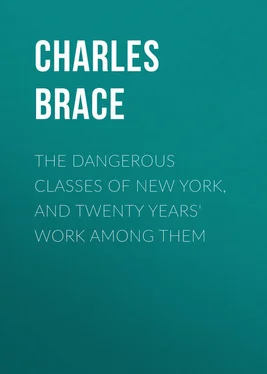Charles Brace - The Dangerous Classes of New York, and Twenty Years' Work Among Them
Здесь есть возможность читать онлайн «Charles Brace - The Dangerous Classes of New York, and Twenty Years' Work Among Them» — ознакомительный отрывок электронной книги совершенно бесплатно, а после прочтения отрывка купить полную версию. В некоторых случаях можно слушать аудио, скачать через торрент в формате fb2 и присутствует краткое содержание. Издательство: Иностранный паблик, Жанр: foreign_antique, foreign_prose, на английском языке. Описание произведения, (предисловие) а так же отзывы посетителей доступны на портале библиотеки ЛибКат.
- Название:The Dangerous Classes of New York, and Twenty Years' Work Among Them
- Автор:
- Издательство:Иностранный паблик
- Жанр:
- Год:неизвестен
- ISBN:нет данных
- Рейтинг книги:5 / 5. Голосов: 1
-
Избранное:Добавить в избранное
- Отзывы:
-
Ваша оценка:
- 100
- 1
- 2
- 3
- 4
- 5
The Dangerous Classes of New York, and Twenty Years' Work Among Them: краткое содержание, описание и аннотация
Предлагаем к чтению аннотацию, описание, краткое содержание или предисловие (зависит от того, что написал сам автор книги «The Dangerous Classes of New York, and Twenty Years' Work Among Them»). Если вы не нашли необходимую информацию о книге — напишите в комментариях, мы постараемся отыскать её.
The Dangerous Classes of New York, and Twenty Years' Work Among Them — читать онлайн ознакомительный отрывок
Ниже представлен текст книги, разбитый по страницам. Система сохранения места последней прочитанной страницы, позволяет с удобством читать онлайн бесплатно книгу «The Dangerous Classes of New York, and Twenty Years' Work Among Them», без необходимости каждый раз заново искать на чём Вы остановились. Поставьте закладку, и сможете в любой момент перейти на страницу, на которой закончили чтение.
Интервал:
Закладка:
"In view of these evils we have formed an Association which shall devote itself entirely to this class of vagrant children. We do not propose in any way to conflict with existing asylums and institutions, but to render them a hearty co-operation, and, at the same time, to fill a gap, which, of necessity, they all have left. A large multitude of children live in the city who cannot be placed in asylums, and yet who are uncared-for and ignorant and vagrant. We propose to give to these work, and to bring them under religious influence. As means shall come in, it is designed to district the city, so that hereafter every Ward may have its agent, who shall be a friend to the vagrant child. 'Boys' Sunday Meetings' have already been formed, which we hope to see extended until every quarter has its place of preaching to boys. With these we intend to connect 'Industrial Schools,' where the great temptations to this class arising from want of work may be removed, and where they can learn an honest trade. Arrangements have been made with manufacturers, by which, if we have the requisite funds to begin, five hundred boys in different localities can be supplied with paying work. We hope, too, especially to be the means of draining the city of these children, by communicating with farmers, manufacturers, or families in the country, who may have need of such for employment. When homeless boys are found by our agents, we mean to get them homes in the families of respectable, needy persons the city, and put them in the way of an honest living. We design, in a word, to bring humane and kindly influences to bear on this forsaken class – to preach in various modes the gospel of Christ to the vagrant children of New York.
"Numbers of our citizens have long felt the evils we would remedy, but few have the leisure or the means to devote themselves personally to this work with the thoroughness which it requires. This society, as we propose, shall be a medium through which all can, in their measure, practically help the poor children of the city.
"We call upon all who recognize that these are the little ones of Christ; all who believe that crime is best averted by sowing good influences in childhood; all who are the friends of the helpless, to aid us in our enterprise. We confidently hope this wide and practical movement will have its full share of Christian liberality. And we earnestly ask the contributions of those able to give, to help us in carrying forward the work. * * * * * * * "March, 1858."
In investigating closely the different parts of the city, with reference to future movements for their benefit, I soon came to know certain centres of crime and misery, until every lane and alley, with its filth and wretchedness and vice, became familiar as the lanes of a country homestead to its owner. There was the infamous German "Rag-pickers' Den," in Pitt and Willett Streets – double rows of houses, flaunting with dirty banners, and the yards heaped up with bones and refuse, where cholera raged unchecked in its previous invasion. Here the wild life of the children soon made them outcasts and thieves.
Then came the murderous blocks in Cherry and Water Streets, where so many dark crimes were continually committed, and where the little girls who flitted about with baskets and wrapped in old shawls became familiar with vice before they were out of childhood.
There were the thieves' Lodging-houses' in the lower wards, where the street-boys were trained by older pickpockets and burglars for their nefarious callings; the low immigrant boarding-houses and vile cellars of the First Ward, educating a youthful population for courses of guilt; the notorious rogues' den in Laurens Street – "Rotten Row" – where, it was said, no drove of animals could pass by and keep its numbers intact; and, farther above, the community of young garroters and burglars around Hamersley Street and Cottage Place. And, still more north, the dreadful population of youthful ruffians and degraded men and women in "Poverty Lane," near Sixteenth and Seventeenth streets and Ninth Avenue, which subsequently ripened into the infamous "Nineteenth-street Gang."
On the east side, again, was "Dutch Hill," near Forty-second Street, the squatters' village, whence issued so many of the little peddlers of the city, and the Eleventh Ward and "Corlear's Hook," where the "copper-pickers," and young wood-stealers, and the thieves who beset the ship-yards congregated; while below, in the Sixth Ward, was the Italian quarter, where houses could be seen crowded with children, monkeys, dogs, and all the appurtenances of the corps of organ-grinders, harpers, and the little Italian street-sweepers, who then, ignorant and untrained, wandered through our down-town streets and alleys.
Near each one of these "fever nests," and centres of ignorance, crime, and poverty, it was our hope and aim eventually to place some agency which should be a moral and physical disinfectant – a seed of reform and improvement amid the wilderness of vice and degradation.
It seemed a too enthusiastic hope to be realized; and, at times, the waves of misery and guilt through these dark places appeared too overwhelming and irresistible for any one effort or association of efforts to be able to stem or oppose them.
How the somewhat ardent hope was realized, and the plan carried out, will appear hereafter.
The first special effort that we put forth was the providing of work for these children, by opening
These experiments, of which we made many at different times, were not successful. Our object was to render the shops self-supporting. But the irregularity of the class attending them, the work spoiled, and the necessity of competing with skilled labor and often with machinery, soon put us behind. We had one workshop for pegging boots and shoes in Wooster Street, where we soon got employment for numbers of street-boys; but a machine was suddenly invented for pegging shoes, which drove us out of the field. We tried then paper box and bag-making, carpentering, and other branches; but it may be set down as an axiom, that "Benevolence cannot compete with Selfishness in business." Philanthropy will never cut down the expenses of production, as will individual self-interest.
Moreover, these artificial workshops excite the jealousy of the trades, while they are not so necessary in this country as in Europe, because the demand is so great here for children's labor.
We soon discovered that if we could train the children of the streets to habits of industry and self-control and neatness, and give them the rudiments of moral and mental education, we need not trouble ourselves about anything more. A child in any degree educated and disciplined can easily make an honest living in this country. The only occasional exception is with young girls depending on the needle for support, inasmuch as the competition here is so severe. But for these we often were enabled to provide instruction in skilled labor, which supported them easily; and, if taught cleanliness and habits of order and punctuality, they had no difficulty in securing places as upper servants, or they soon married into a better class.
CHAPTER IX
The spectacle which earliest and most painfully arrested my attention in this work, were the houseless boys in various portions of the city.
There seemed to be a very considerable class of lads in New York who bore to the busy, wealthy world about them something of the same relation which Indians bear to the civilized Western settlers. They had no settled home, and lived on the outskirts of society, their hand against every man's pocket, and every man looking on them as natural enemies; their wits sharpened like those of a savage, and their principles often no better. Christianity reared its temples over them, and Civilization was carrying on its great work, while they – a happy race of little heathens and barbarians – plundered, or frolicked, or led their roving life, far beneath. Sometimes they seemed to me, like what the police call them, "street-rats," who gnawed at the foundations of society, and scampered away when light was brought near them. Their life was, of course, a painfully hard one. To sleep in boxes, or under stairways, or in hay-barges on the coldest winter-nights, for a mere child, was hard enough; but often to have no food, to be kicked and cuffed by the older ruffians, and shoved about by the police, standing barefooted and in rags under doorways as the winter-storm raged, and to know that in all the great city there was not a single door open with welcome to the little rover – this was harder.
Читать дальшеИнтервал:
Закладка:
Похожие книги на «The Dangerous Classes of New York, and Twenty Years' Work Among Them»
Представляем Вашему вниманию похожие книги на «The Dangerous Classes of New York, and Twenty Years' Work Among Them» списком для выбора. Мы отобрали схожую по названию и смыслу литературу в надежде предоставить читателям больше вариантов отыскать новые, интересные, ещё непрочитанные произведения.
Обсуждение, отзывы о книге «The Dangerous Classes of New York, and Twenty Years' Work Among Them» и просто собственные мнения читателей. Оставьте ваши комментарии, напишите, что Вы думаете о произведении, его смысле или главных героях. Укажите что конкретно понравилось, а что нет, и почему Вы так считаете.












